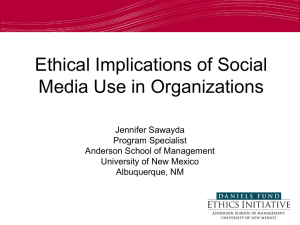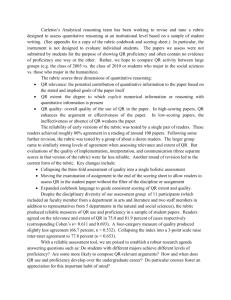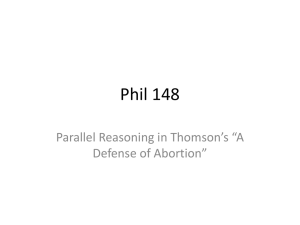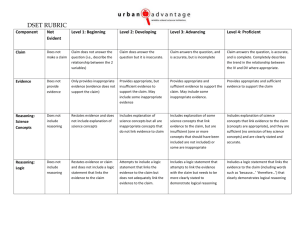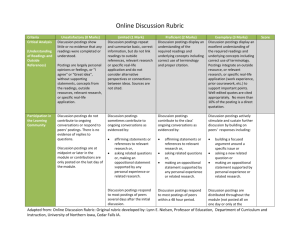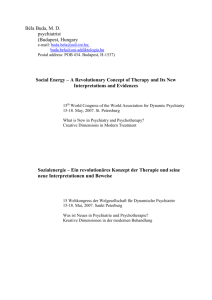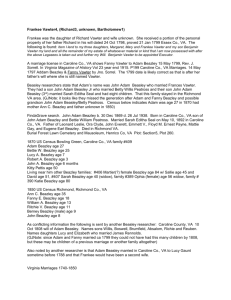Think Critically Rubric pdf
advertisement
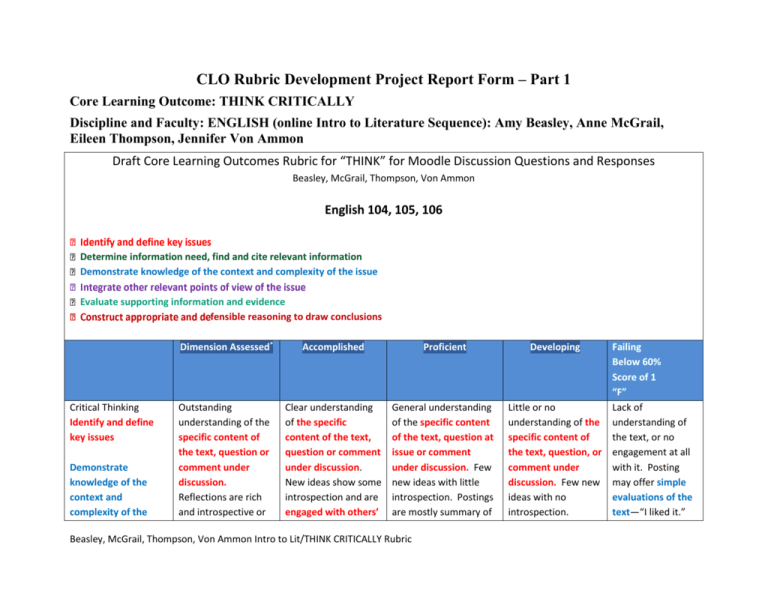
CLO Rubric Development Project Report Form – Part 1 Core Learning Outcome: THINK CRITICALLY Discipline and Faculty: ENGLISH (online Intro to Literature Sequence): Amy Beasley, Anne McGrail, Eileen Thompson, Jennifer Von Ammon Draft Core Learning Outcomes Rubric for “THINK” for Moodle Discussion Questions and Responses Beasley, McGrail, Thompson, Von Ammon English 104, 105, 106 Determine information need, find and cite relevant information Demonstrate knowledge of the context and complexity of the issue Evaluate supporting information and evidence fensible reasoning to draw conclusions Critical Thinking Identify and define key issues Demonstrate knowledge of the context and complexity of the Dimension Assessed* Accomplished Proficient Outstanding understanding of the specific content of the text, question or comment under discussion. Reflections are rich and introspective or Clear understanding of the specific content of the text, question or comment under discussion. New ideas show some introspection and are engaged with others’ General understanding of the specific content of the text, question at issue or comment under discussion. Few new ideas with little introspection. Postings are mostly summary of Beasley, McGrail, Thompson, Von Ammon Intro to Lit/THINK CRITICALLY Rubric Developing Failing Below 60% Score of 1 “F” Little or no Lack of understanding of the understanding of specific content of the text, or no the text, question, or engagement at all comment under with it. Posting discussion. Few new may offer simple ideas with no evaluations of the introspection. text—“I liked it.” issue Relevance and Connections Determine information need, find and cite relevant information deeply engaged with others’ ideas. Utilizes and develops terminology learned over the course of the term correctly and with increasing sophistication. Thoughtful analysis relates specific parts to the whole, recognizing relations between them and clearly and artfully articulating the significance of those connections. Evaluations---“I like it” “I hated it”—are anchored in insightful analysis. Rich and fully developed, if brief, ideas and connections to the assigned readings, question at issue or others’ answers to the question. Specific references to the ideas but may lack depth. Utilizes and develops terminology learned over the course of the term correctly. Analysis relates specific parts to the whole, recognizing relations between them and articulating some understanding of the significance of those connections. Evaluations—“I liked it” “I hated it”—are clearly anchored in analysis. general plot points or other aspects of the material. Some use of terminology learned, but sometimes incorrectly or without effect. Analysis may feel mostly like summary, with little relating of parts to the whole. Little reflection on significance of patterns as they develop. Sometimes uses evaluations—“I liked it” “I hated it” in the place of sustained engagement. Cursory summary of points and little developing use of course terminology. Simple evaluations offered in the place of analysis. “It was boring” as a replacement for critical analysis. Thoughtful responses to the assigned readings, question at issue or to others’ answers to the question. Specific references to the text, including quotes, are Postings reflect a cursory if correct reading of the text, question at issue, or lecture notes. Little specificity in referring to the text. Postings demonstrate a weak engagement with the Postings reflect a cursory and even incorrect reading of the text, question at issue, or lecture notes. Opinions may be irrelevant or tangential. No quotes or specificity. Incorrect or absent reading of the text, question at issue, or lecture notes. Tangential postings that may be rambling with “filler” rather than serious work Beasley, McGrail, Thompson, Von Ammon Intro to Lit/THINK CRITICALLY Rubric text, including quotes, are consistent and incisive. Insightful applications of new material—including lecture notes—to previous material and the primary text. Integration of previous texts and terms to new material is outstanding and consistent. Uniqueness, Freshness, Originality, Contribution Construct appropriate and defensible reasoning to draw conclusions Exceptionally insightful, well reasoned, original or fresh approach to or use of the text, lecture notes, or others’ postings. The instructor feels she has learned something, and/or peers have benefited from the students’ contribution. consistent. Reading notes demonstrate thoughtful effort to engage directly with the text. Applications of new material—including lecture notes—to previous material and the primary text. Consistent and competent integration of previous texts and terms to new material. Interesting and engaged, wellreasoned approach to the text, lecture notes, or others’ postings. The instructor and others may feel that the response is familiar but the posting shows thoughtfulness and engagement. text. There is some application of previous reading to present text, but it is unclear and inconsistent. Occasional irrelevant or tangential material included. Postings demonstrate a lack of engagement with the text; the reader of the posting may feel as if the student has only read a Cliff Notes version of the text. There is little or no application of the previous reading to the present text. engaged in the text or question at issue. A careful reader can follow the logical argument or approach to the text, but the response may lack originality or freshness and reasoning may show some oversimplification or missed logical steps. Ideas may feel overly familiar or rehashed at times, although there is consistent effort to A careful reader may not be able to ascertain the logical argument being offered. Consistently unoriginal approach to the material, often devolving into summary. Instructor and peers may have the sense they are reading a rehashing of a LitNotes website. The posting does not contribute to the conversation about the text. Reasoning is indefensible or indiscernible. Postings border on plagiarism with ideas that are hackneyed and seemingly lifted directly from others work. Actual Beasley, McGrail, Thompson, Von Ammon Intro to Lit/THINK CRITICALLY Rubric Timeliness On time. On time. Stylistics and Completeness Strong command of standard English. Even informal language is always appropriate and uses fresh vocabulary; grammar errors are at a minimum. Command of standard English. Informal language is always appropriate and grammar errors are at a minimum. Group Dynamics/Interaction with Others’ Ideas “Listens” to others’ comments, acknowledges and builds on them. Summarizes and acknowledges other students’ work and encourages increased effort and perseverance among peers. Explores and supports developing issues. Asks challenging questions about reasoning or evidence brought to “Listens” to others’ comments and acknowledges them. Explores and supports developing issues. Asks relevant questions about reasoning or evidence brought to bear on others’ arguments. relevant points of view of the issue Evaluate supporting information and evidence engage with the concepts and material at hand. On time/late combination. Use of standard English with lapses. Informal language is always appropriate and grammar errors may be frequent but minor. Participates in discussions but does not actively “listen” to others’ comments. Loses the “thread” or may post without reference to anyone else’s ideas. Beginning to explore other ideas and beginning to ask questions about the reasoning or evidence brought to bear on others’ arguments. Beasley, McGrail, Thompson, Von Ammon Intro to Lit/THINK CRITICALLY Rubric plagiarism also in this category. Late Late or not at all. Lack of use of standard English. Informal language is inappropriate for a college class. Grammar errors may be frequent and minor or major. Lack of use of standard English. Informal language is inappropriate for a college class. Grammar errors may be frequent and minor or major. Does not post at all, does not engage with ideas of others, or does not engage according to instructions. No relevant questions offered. May post, but may not follow instructions; does not participate in discussions or “listen” to others’ comments. Little attempt to explore other ideas and few or no questions about the reasoning or evidence brought to bear on others’ arguments. bear on others’ arguments. Beasley, McGrail, Thompson, Von Ammon Intro to Lit/THINK CRITICALLY Rubric
